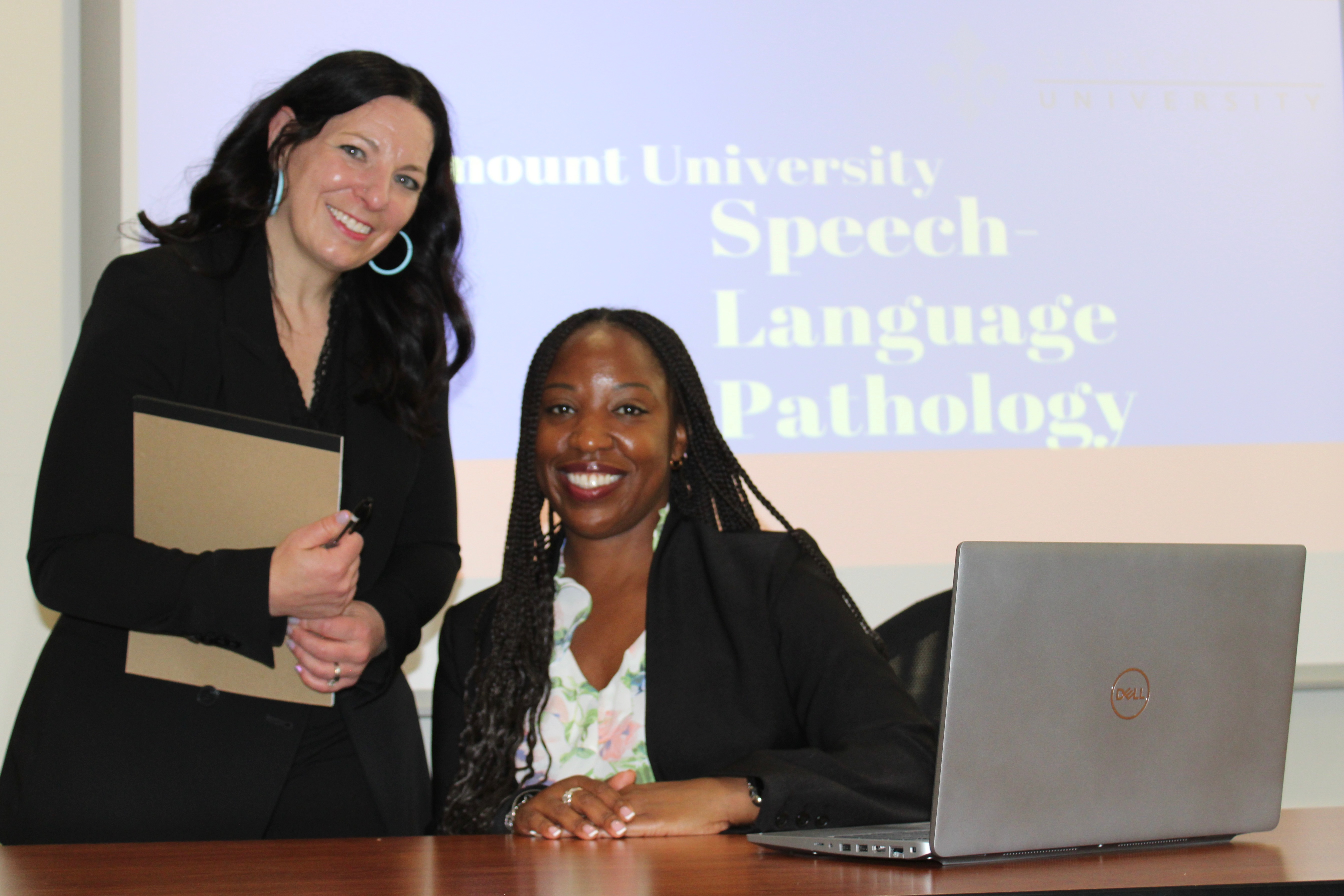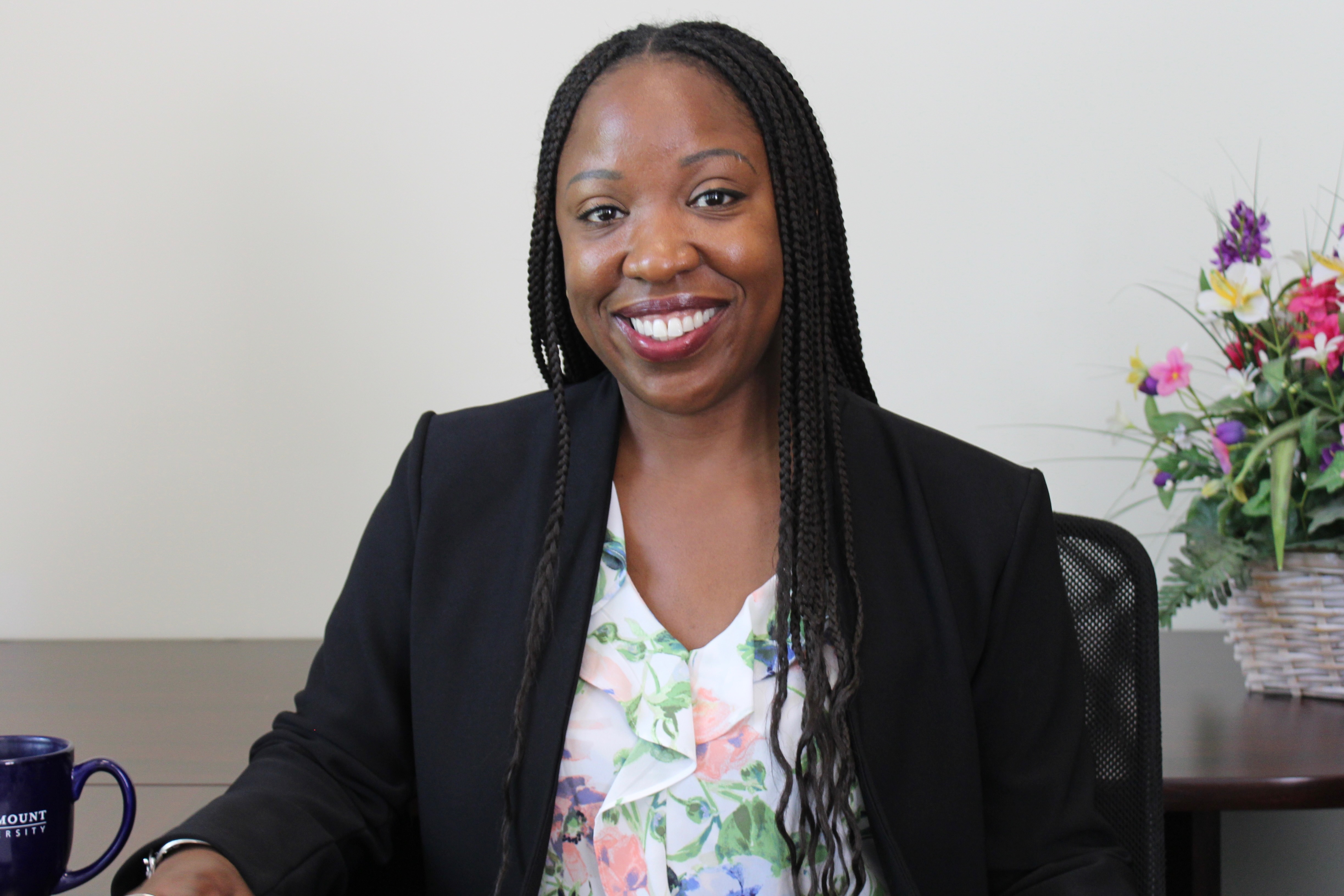Where Purpose Meets Practice: A Closer Look at Careers in Speech-Language Pathology

If you’re exploring a degree in speech-language pathology or looking into careers in speech-language pathology, you’re likely someone who values connection, service and purpose. Speech-language pathologists (SLPs) do more than treat communication and swallowing disorders; they empower people to engage with the world in deeply human ways. From helping children find their voice to guiding adults through recovery after a stroke, SLPs work at the intersection of teaching, science, care and compassion.
At Marymount University, we prepare speech-language pathologists who lead with integrity, cultural humility, and compassion. One of the guiding lights in our program is Tamika LeRay, MS, CCC-SLP, a dynamic clinician, educator and leader whose career path shows just how diverse and impactful the field can be. Her journey helps illustrate how a degree in speech-language pathology can open the door to a lifetime of meaningful and mission-driven work with a career in speech-language pathology.
What Can You Do with a Degree in Speech-Language Pathology?
A degree in speech-language pathology is not a one-size-fits-all credential. Instead, it offers a wide spectrum of career pathways that allow you to serve individuals and communities across the lifespan and in a range of settings:
1. Schools and Early Intervention
A career in speech-language pathology can begin in your local school system. SLPs help children with language delays, articulation issues, stuttering, and social communication challenges. In early intervention, SLPs support infants and toddlers who may be showing early signs of developmental delays. SLPs also support elementary schools, middle schools and high schools.
2. Medical and Rehabilitation Settings
Hospitals, rehab centers, and outpatient clinics rely on SLPs to treat patients with traumatic brain injuries, strokes, neurological conditions, or cancer. A career in speech-language pathology in medical settings involves assessing and treating disorders related to speech, language, cognition, and swallowing, playing a vital role in recovery in traumatic brain injury, stroke and other progressive diseases.
3. Private Practice and Consulting
SLPs may choose a career in speech-language pathology to work independently or start their own practices, offering personalized care to clients of all ages. Some specialize in bilingual services, voice therapy or autism support. Others consult for schools, hospitals or community agencies.
4. Higher Education and Research
Those who pursue academic careers contribute to research and train future SLPs. They explore topics like language development, equity in healthcare and neurogenic communication disorders. With a degree in speech-language pathology, some professionals go on to earn a doctorate and teach at the university level.
5. Telepractice and Technology-Enhanced Care
The COVID-19 pandemic accelerated the adoption of telepractice. Many SLPs now deliver services remotely, expanding access for clients in rural or underserved areas. This growing career in speech-language pathology allows for flexibility and innovation in care.
6. Leadership, Policy, and Advocacy
SLPs also work in policymaking, nonprofit leadership and program development. They design services, advocate for inclusive education and promote access to care. A career in speech-language pathology can make a systemic impact.
Tamika LeRay: A Real-World Example of What’s Possible
Tamika LeRay has built a remarkable career rooted in service, equity, and clinical excellence. With over 13 years of experience as a speech-language pathologist, her work reflects what’s possible when a clinician combines strong academic training with a deep commitment to justice.
Clinical Excellence Across Settings
Tamika began her career in Boston Public Schools, where she supported children from culturally and linguistically diverse backgrounds. She quickly gained recognition for her work in sociolinguistics and inclusive assessment. Her ability to tailor interventions to students' unique language profiles made her a trusted mentor for other clinicians.
She later moved to Washington, D.C., working in both public schools and early childhood programs. As a provider with DC Public Schools (Early Stages), Tamika collaborates with multidisciplinary teams to evaluate and support young children transitioning from early intervention to preschool special education. She applies her clinical expertise while navigating fast paced and complex systems of care.
Leadership in Special Education
Tamika expanded her impact as the Director of Special Education for the Virgin Islands Department of Education. There, she helped manage a $3.5 million budget, oversaw services across multiple schools, and improved educational outcomes for over 1,000 students. Her leadership bridged clinical work and administrative strategy, showing how SLPs can excel beyond direct care.
Mentorship and Academic Engagement
Tamika is passionate about mentoring future professionals. She serves as a volunteer mentor with ASHA STEP supporting recent graduates and graduate students as they build their skills and confidence.
She has also contributed academic research, including work on the Diagnostic Evaluation of Language Variation (DELV), and presented nationally on the intersection of sociolinguistics, race, and communication. Her teaching and guest lectures emphasize culturally responsive care, ethics, and school-based practice.
Research and Future Vision
Currently pursuing her Doctorate in Special Education, Tamika is researching educator attrition in the U.S. Virgin Islands. Her work continues to center equity, systemic change, and community wellbeing.
Her story reminds us that careers in speech-language pathology aren’t linear. They grow and evolve. Whether in a clinic, classroom, boardroom, or Zoom room, SLPs like Tamika are always advocating, adapting, and serving with purpose.
Why Choose Marymount University for Your Degree in Speech-Language Pathology?
At Marymount, we offer a 46-credit, full-time, online Master’s Degree in Speech-Language Pathology. But our program is more than just coursework. It’s a journey of transformation.
What Sets Our Program Apart:
- Justice-Centered Curriculum: We ground all learning in equity, ethics and real-world challenges.
- Personalized Mentorship: Faculty like Tamika are more than instructors — they are mentors, advocates and collaborators.
- Hands-On Clinical Experience: Students complete clinical placements close to where they live, applying skills in community settings.
- A Diverse, Supportive Community: Our cohorts are small, intentional and inclusive. We celebrate the lived experiences and cultural identities that each student brings.
Marymount University is located just outside Washington, D.C., a hub of innovation and advocacy. Students benefit from a global perspective and local impact.
What Makes a Great SLP?
SLPs must be excellent listeners, critical thinkers, and creative problem-solvers. But perhaps most importantly, they must be compassionate professionals who approach every individual with curiosity and care. At Marymount, we believe that your values are just as important as your skills. That’s why we welcome applicants who bring:
- A passion for communication and connection
- A commitment to equity and inclusion
- A desire to serve communities in ethical, collaborative ways
- Bilingual or multilingual skills
- Diverse academic or professional backgrounds
Our admissions process is holistic, inclusive and designed to understand your full story.
Your Future, Your Way
With a degree in speech-language pathology, your career can go in many directions. You might:
- Support nonverbal children with autism to communicate with AAC
- Help a stroke survivor regain their voice
- Train teachers on how to support students with language delays
- Launch your own practice or become a policy advisor
- Mentor future SLPs, like Tamika does
Whatever your path, Marymount is here to help you lead with purpose, grounded in care.
Ready to Begin?
A career in speech-language pathology offers fulfillment, flexibility and the opportunity to truly make a difference. And at Marymount, you don’t just earn a degree — you join a community that believes in your voice, your vision and your ability to create change.
To learn more about our program or to connect with mentors like Tamika LeRay, visit Marymount University’s SLP Program page. Let’s shape the future of communication together.

